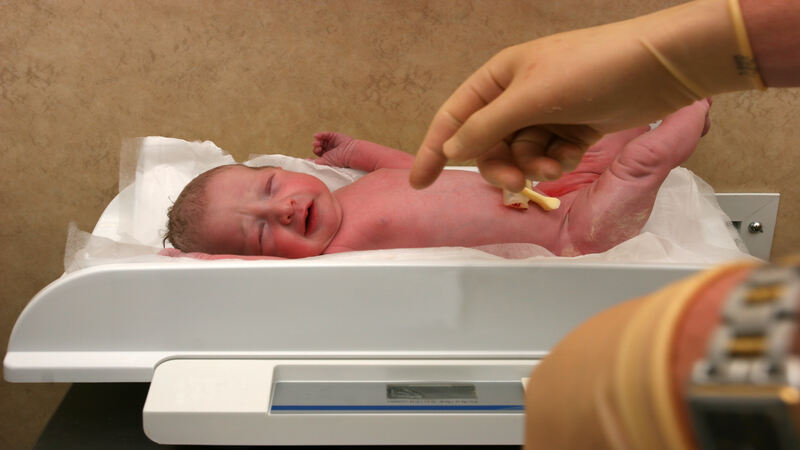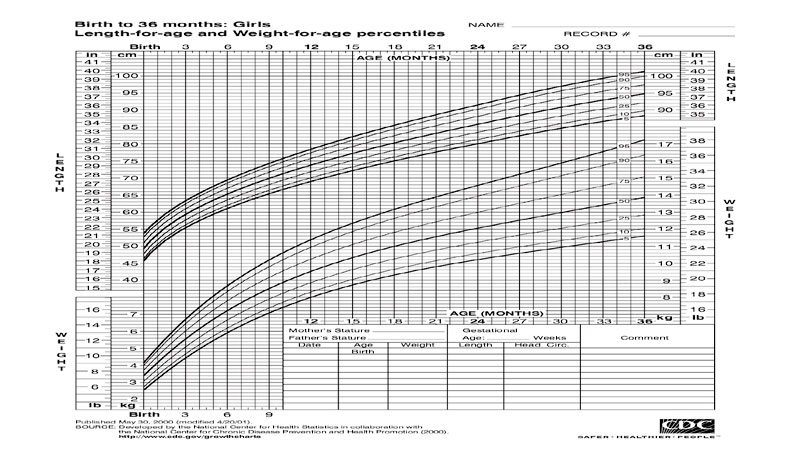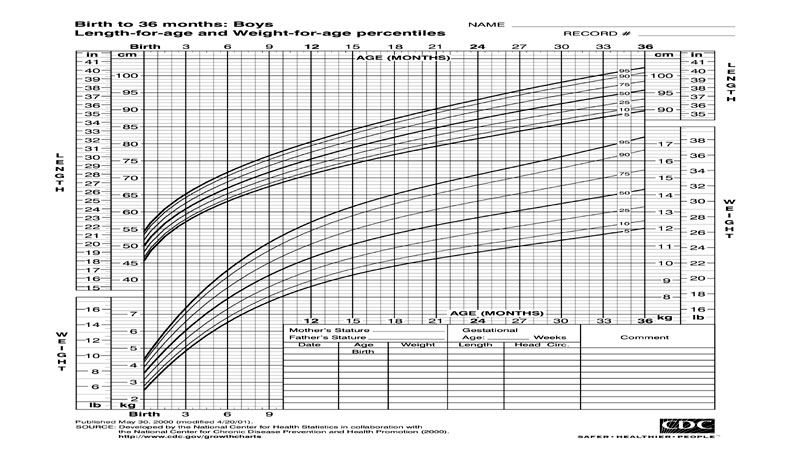
Do you have a preemie? Do you want to make sure that they are on the right track when it comes to weight gain? Are you searching for more information on the optimal weight gain for your preemie? If the answers to these questions are yes, continue reading to learn more about premature baby weight gain and the weight chart that will help you learn about the weight your premature baby should be gaining weekly.
Caring for and raising a preemie can be challenging yet fulfilling. Their feed requirements and growth patterns may vary from a full-term baby for a couple of weeks or months. Here is everything you need to know about premature baby height and weight chart.
Who is a Premature Baby?
A baby is premature if they are born any time before 37 weeks of gestation (1). The preemie has to overcome several obstacles regarding their health.
Many parents, especially new mothers, often feel anxious over their baby’s weight and the rate at which the newborn is gaining weight. — General weight gain can be a point of — worry and tension for parents of premature babies.
Some of the most significant factors that ought to be taken care of when it comes to preemies are, providing them optimum nourishment and ensuring adequate weight gain. Both of these factors are vital for the overall health and development of the baby. Feeding and nutrition for a premature baby will not be the same as those of babies who are born full-term.
[Read: Common Health Issues of Premature Babies]
How Much Does a Premature Baby Generally Weigh?

On average, a full-term baby weighs around 3.2kg (2). However, the weight of the preterm babies depends on how early they are born. More often, preemies weigh less than 2.5 kg (3).
The earlier the delivery, the lesser the weight of the preemie. Due to various advances in the field of medical science, the survival rate for a baby born at 28 weeks is about 80-90% (4).
A study conducted in Germany showed that 60% of preemies weighing more than 500 gms were able to pull through the various hurdles they faced after birth (5).
Apart from these facts, some preemies, especially those who are born closer to the due date, are found to weigh nearly as much as full-term infants.
How is the Age of Premature Baby Calculated?
When it comes to growth and development, finding out if the preemie is catching up with the milestones is important to figure out the premature baby’s exact age!
Yes, you celebrate your baby’s birthday on the day they were born. However, to read the growth chart correctly, the age calculations need to be done a little differently (6). Premature babies go by their altered ages. Here is a simple way to calculate it.
Subtract the number of weeks they are premature from the current week. That is, if the baby is 12 weeks old and if they have arrived three weeks earlier, then you should check the premature baby weight chart to see if they are catching up with the milestone of 9 weeks instead of 12 weeks (12-3).
Weight For Age Percentile Chart For Babies Upto 36 months
Below is the percentile chart for baby girls and boys upto the age of 36 months. This chart is sourced from CDC National Centre for Health Statistics. You can calculate the corrected age of your baby and refer to this.
Growth Chart For Baby Girls (Birth to 36 Months)

Source: cdc.gov – Growth Chart For Girls
Growth Chart For Baby Boys (Birth to 36 Months)

Source: Birth to 36 months: Boys, Length-for-age and Weight-for-age percentiles (cdc.gov)
When do Premature Babies Start Gaining Weight?
The weight gain of premature babies depends on a lot of factors, and one of them is how soon the baby is born. Premature babies start gaining weight a few days after birth.
The growth velocity rates in preemies are usually approximately 15 g/Kg/day weight and about 1 cm/week increase in height (7).
Premature Baby Weight Calculator
The following is a premature baby weight chart that will help you understand the desired weight gain of a preemie week by week.
| Gestational Age (Weeks) | Average Weight (Kgs) | Average Weight (Ounces) | Average Length (Centimeters) | Average Length (Inches) | Average Head Circumference (Centimeters) | Average Head Circumference (Inches) |
|---|---|---|---|---|---|---|
| 23 | 0.58 | 20.6 | 29.9 | 11.8 | 20.9 | 8.2 |
| 24 | 0.65 | 23 | 31.1 | 12.2 | 21.8 | 8.6 |
| 25 | 0.73 | 26 | 32.3 | 12.7 | 22.7 | 8.9 |
| 26 | 0.82 | 29.2 | 33.6 | 13.2 | 23.6 | 9.3 |
| 27 | 0.93 | 33 | 35 | 13.8 | 24.5 | 9.6 |
| 28 | 1.06 | 37.4 | 36.5 | 14.4 | 25.5 | 10 |
| 29 | 1.2 | 42.5 | 38 | 15 | 26.5 | 10.4 |
| 30 | 1.37 | 48.4 | 39.5 | 15.6 | 27.5 | 10.8 |
| 31 | 1.54 | 54.5 | 41 | 16.1 | 28.4 | 11.2 |
| 32 | 1.73 | 61.1 | 42.3 | 16.7 | 29.3 | 11.5 |
| 33 | 1.95 | 69 | 43.7 | 17.2 | 30.2 | 11.9 |
| 34 | 2.18 | 77.1 | 45 | 17.7 | 31.1 | 12.2 |
| 35 | 2.41 | 85.1 | 46.2 | 18.2 | 31.9 | 12.6 |
| 36 | 2.66 | 94 | 47.4 | 18.7 | 32.7 | 12.9 |
| 37 | 2.93 | 103.6 | 48.5 | 19.1 | 33.3 | 13.1 |
| 38 | 3.17 | 111.9 | 49.5 | 19.5 | 33.7 | 13.3 |
| 39 | 3.33 | 117.7 | 50.2 | 19.8 | 34 | 13.4 |
| 40 | 3.45 | 121.8 | 50.8 | 20 | 34.3 | 13.5 |
| 41 | 3.53 | 124.5 | 51.3 | 20.2 | 34.5 | 13.6 |
Weight Gain and Feeding of Preemie

If your preemie is born earlier than 34 weeks, feeding will obviously be a reason for worry. Most of the babies are able to coordinate sucking, swallowing and breathing necessary for feeding by about 34-36 weeks (8).
You may not be able to breastfeed the baby or even feed by using a bottle. This is because your preemie is not mature enough to suck, breathe and gulp at the same time. But then it is very important for the baby to get enough nutrition to gain proper weight.
Premature babies are prone to a lot of complications that can interfere with their capability to feed by mouth. The risk of choking is very high and can be dangerous for preemies. Some of the issues include:
-
- Breathing difficulties
- Low level of oxygen
- Issues related to the circulatory system
A neonatal pediatric specialist will first evaluate your baby’s condition and then decide the best method of feeding in the initial days. Here are some alternative feeding methods for the preemies:
1. Feeding Through IV Lines
The fluids and nutrition can be given through intravenous (IV line), that is placed in the arm, leg or even the soft skull of the preemie. This method is suggested if:
The baby is born before 31 weeks and the digestive system is also immature (9).
The baby develops breathing problems as their lungs are not fully developed.
2. Gavage Feeding
Gavage feeding is a method through which breast milk or formula is directly carried to the baby’s stomach. A tube is put through the baby’s nose to carry breast milk or formula to the stomach (10). This method is suggested for:
- The preemies who are too small or weak and have problems coordinating their suck and swallow reflexes.
- If they have lung and heart problems.
- Babies whose digestive system is mature enough to digest the breast milk or formula that is given to them.
3. Breast And Bottle Feeding
Once the baby has developed the skill of harmonizing sucking and swallowing, the medical team will help the parents to attempt breast-feeding. The mother and child will be discharged from the hospital only after the mother is able to feed the baby and the baby can swallow and digest the milk given to them.
Breast milk is the best choice for your baby. If you are making enough milk, you can express milk and the pumped breast milk can be given to the baby once they are ready for either gavage, breastfeeding or bottle feeding. If the breast milk is not sufficient then donor breast milk or formula milk are other options.
The quantity of milk or formula is gradually increased, especially in case of very premature babies. There may be a need to mix a supplement called HMF or Human Milk Fortifier in the breast milk for the preemies who are fed only breast milk in order to provide them with extra proteins, calcium, vitamins, iron and calories (11). More frequent feeding is needed for preemies as they are in need of more nutrition and are prone to dehydration.
Every baby grows and gains weight at a different rate. As long as your baby is healthy and happy you have nothing to worry about.
FAQ’s
1. How Much Do Premature Babies Weigh at Birth?
It varies from baby to baby. In general, babies born before 37 weeks or less than 2.5Kg are considered premature.
2. Is Very Low Birth Weight Risky?
Low birth weight babies can have serious complications like low oxygen levels at birth, feeding difficulties, breathing issues and even developmental delays.
3. How Much Should My Baby Weigh if Born at 27 Weeks?
Your baby should be close to a kilogram if born at 27 weeks of pregnancy.
4. How Can I Help My Preemie Gain Weight?
Check with your doctor. Regular feeding – breast milk or formula is only recommended. Your doctor might recommend Human Milk Fortifier.
5. Why do Premature Babies Gain Weight Slower?
Premature babies tend to grow slowly mostly due to feeding difficulties. They are unable to coordinate sucking and swallowing at the same time due to poor development of muscles.
6. Can a 1.5kg Baby Survive?
With the advancement in medical technology and proper NICU care, a baby born with 1.5 Kg weight will be able to survive.
References
- World Health Organization;Preterm Birth – https://www.who.int/news-room/fact-sheets/detail/preterm-birth
- Newborn Measurements; Health Encyclopedia; University of Rochester Medical Center – https://www.urmc.rochester.edu/encyclopedia/content.aspx?contenttypeid=90&contentid=P02673r
- World Health Organization;Newborn Health; Preterm and Low Birth Weight – Infantshttps://www.who.int/teams/maternal-newborn-child-adolescent-health-and-ageing/newborn-health/preterm-and-low-birth-weight
- Health; University of UTAH;When Is It Safe to Deliver Your Baby? – https://healthcare.utah.edu/womens-health/pregnancy-birth/preterm-birth/when-is-it-safe-to-deliver
- Brumbaugh JE, Hansen NI, Bell EF, et al. Outcomes of Extremely Preterm Infants With Birth Weight Less Than 400 g. JAMA Pediatr. 2019;173(5):434–445. – https://jamanetwork.com/journals/jamapediatrics/fullarticle/2728460
- The Warren Center For Children With Developmental Differences;Corrected (Adjusted) Age for Preemies – https://thewarrencenter.org/help-information/premature-birth/corrected-adjusted-age-for-preemies/
- Greer, F.R., Olsen, I.E. How Fast Should the Preterm Infant Grow?. Curr Pediatr Rep 1, 240–246 (2013). https://doi.org/10.1007/s40124-013-0029-1 – https://link.springer.com/article/10.1007/s40124-013-0029-1
- National Health Services, Great Britain;Breastfeeding your premature baby – https://www.nhs.uk/conditions/baby/breastfeeding-and-bottle-feeding/breastfeeding/premature-baby/
- Neonatal parenteral nutrition. London: National Institute for Health and Care Excellence (NICE); 2020 Feb 26. – https://www.ncbi.nlm.nih.gov/books/NBK555677/
- Stanford Medicine Children’s Health, Nutrition and Fluids in the NICU –https://www.stanfordchildrens.org/en/topic/default?id=nutrition-and-fluids-in-the-nicu-90-P02391
- University of Rochester Medical Center, Health Encyclopedia, Adding to Mother’s Milk – https://www.urmc.rochester.edu/encyclopedia/content.aspx?contenttypeid=90&contentid=P02333
Read Also: Indian Baby Weight and Height Chart – 0 to 12 Months
